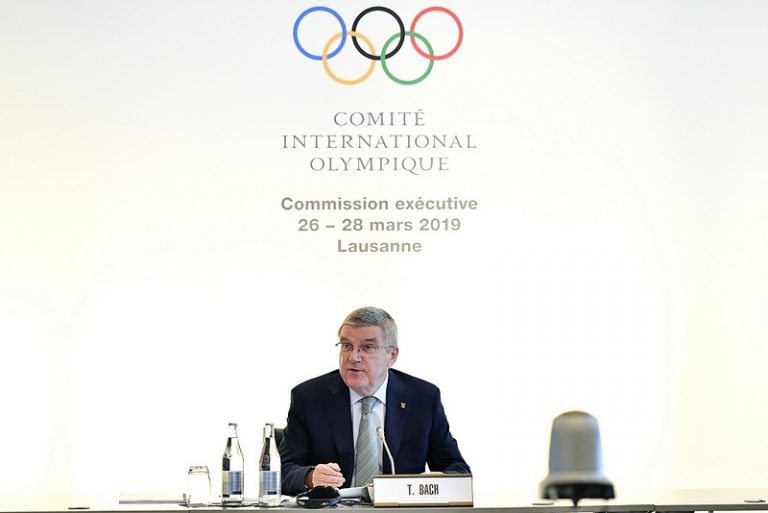
BidWeek, Reporting From Toronto, Canada – Last week, the International Olympic Committee (IOC) not only changed the Olympic bid process, the organization completely dismantled the decades-old method used to elect cities to host the Games.
By voting to remove just a couple of key sections from the Olympic Charter, IOC members at their 134th Session held in Lausanne on June 24 agreed to hand over much of their influence on the site selection process to the IOC Executive Board – and primarily IOC President Thomas Bach.
The head-to-head battles between major world cities that showcased sports facilities, their athletes, culture and infrastructure may be gone forever. Hitting a pinnacle in 2005 when London narrowly defeated Paris to host the 2012 Games in an epic battle among Madrid, New York and Moscow – the drama, pageantry and diplomacy that leads to the election of an Olympic host city may never be known again.
I was asked in Lausanne last week, and several times since “how will the changes impact GamesBids.com,” the only media source dedicated to reporting on Olympic bids and the process surrounding them.
“What will you do now that the bid process is essentially done?”
Hear this. The Olympic bid process is not over.
Not even close.
Senior Canadian IOC Member Dick Pound, known as the doyen among his Olympic colleagues, said as the changes were being rolled out “one way or another, every two years, we have a Games to celebrate.”
“And we have to be able to find hosts for that which involves recognizing what we’re calling the new reality – and that may change too,” he told his peers at the Session last week.
The site selection process is alive and well and the “evolution of the revolution,” as IOC President Thomas Bach describes the new process, could be the most predominate factor shaping the Olympic Movement for the next generation.

But the IOC, with these changes. could narrow down potential hosts in secrecy – perhaps only revealing information to members and the public on a need-to-know basis.
Surprisingly, this revelation also came from Pound – one of the most candid IOC members ever.
He said “I certainly have no hesitation in allowing a [future host] commission to have discussions that are out of the public eye that perhaps occur with sports authorities or interested groups even before the governments have been engaged in this, and can be done on a very confidential basis.”
“The confidentiality factor may cause you to think about how much information the members get in a public forum like a Session before sufficient preparatory measures have been taken in the potential host areas. If things get out too early it can be more problematic than ever,” he added.
“But the organization should not hide the process behind a cloak, especially if they hope to win back the trust of the general population of cities who have voted down nine straight Olympic bids by referendum, primarily due to their doubts surrounding the IOC.” – Livingstone
Don’t expect press releases declaring the list of bid applicants; don’t expect publicly announced site inspections by the Future Host Commissions; don’t expect, immediately, a public outreach campaign by an interested city; expect, potentially, to be left in the dark about which cities are vying to host the most important, most costly and most transformative event on the planet.
It seems this evolution is instead a devolution back to the 1980’s and 1990’s when a translucent bid process eventually led to the Salt Lake City bribery scandal resulting in the expulsion of corrupt IOC members for the first time in the organization’s history.

It was at the same time, in 1998, that the earliest version of GamesBids.com launched online, when nobody published news on the Web. The bid process was murky, and there was a dire need to shine a light on backroom deals where the mix of power and greed created risk for the international sport movement so many around the world cherished.
It was a watershed moment for the IOC, the scandal coinciding with the birth of mainstream Internet and the consumption of online news. IOC President Jacques Rogge was elected in 2001, and helped implement new rules that would force many of the mechanics of the bid process into plain view.
In 2002, I worked with PyeongChang 2010 and the other Winter Olympic bids to have their questionnaires and bid books published online, in their entirety, for the first time ever – and right in the middle of the campaign. In subsequent bid cycles, it became part of the process.
Previously bid books had been kept under wrap, secured until a host city had been elected and then only found on dusty library shelves.
Bid process transparency reached its pinnacle in the latest 2026 cycle that ended just last month with Milan-Cortina in Italy defeating Stockholm Åre. The media were given unprecedented access to the IOC Evaluation Commission, IOC staff and officials, and certain meetings that in the past had been held behind closed doors.
Then last week in Lausanne, with a simple unanimous showing of members’ raised hands, a dark curtain fell once again, cloaking the bid process and raising doubt. Most decisions will now be made among the new Future Host Commission members and the IOC Executive Board – both largely controlled by President Bach.

It is now more important than ever for GamesBids.com and other Olympic sports media around the world to keep a close eye on what’s happening behind the scenes, and how future Olympic hosts get elected.
Yesterday – on World Sports Journalists Day observed each July 2 to commemorate the founding of L’Association Internationale de la Presse Sportive (AIPS) in 1924 – I realized that it will be the difficult job of the media to monitor the bid process, and ensure that the IOC remains true to the fundamentals of Olympism it defines in its Charter, as it selects hosts.
The IOC will have challenges of its own while first navigating its new process. Engaging a city first in secrecy then expecting strong public support before the bid can be accepted – perhaps even requiring a referendum to prove the will of taxpayers – could be troublesome.
Pound cast doubt on the required referenda strategy, highlighting the chances that it will exclude strong bids.
He said “these days as we’ve seen, particularly in developed democracies where 25 percent of the people are against everything all the time, you’re playing with an uncommitted two-thirds or three-quarters and even if you have a two to one majority, you’re only back to 50-50.”
This hurdle for many Western democracies may instead be a beacon for more totalitarian governments that will be able to provide the IOC with exactly what they want and need. But that may not be what’s best for the universal Olympic Movement,

Already there is a buzz around bids for the 2032 Summer Games, with most cities caught off guard as the process that wasn’t expected to be launched until 2023 is now underway.
Coates, the architect of the new bid process, last month told his Australian Olympic Committee (AOC) that the Games could be awarded as early as July 2020 – and that a bid from Brisbane and Southeast Queensland could be the leading contender. Coates is also a Vice President of the IOC. You wouldn’t be wrong if you perceived some conflict-of-interest.
But, in a complex organization such as the IOC that has intertwined governance with other major sports bodies around the world, such blurred roles are not uncommon.
However, with the process now sinking into secrecy, we may never know whether the Vice President or those who support him use undue influence to further his agenda.
There is also a potential joint bid developing between Capitals Seoul and Pyongyang – that’s right, North Korea. IOC President Bach has already encouraged this bid. How would a referendum work in a nation mostly known for human rights atrocities? Do organizers there get to skip a vote and move straight to a ballot?

Jakarta in Indonesia, Shanghai in China, India and Germany are also working towards bids for 2032 with a 2025 election date in mind. It is yet unclear if the new bid changes have changed their minds.
Sapporo in Japan, Lillehammer in Norway and Barcelona have outlined plans to bid for the 2030 Winter Games, and Salt Lake City – in an ambiguity that the IOC can appreciate – will bid for a “future Games.” Discussions, I presume, will start shortly in private.
What is clear, is how unclear these races will be. Already there is so much to cover on bids for Games that are more than 10 years away, and can be forwarded for election by the IOC Session at any time.
“If things get out too early it can be more problematic than ever” – IOC Member Dick Pound
Fundamentally, the new process could work for the IOC and its need to select strategic hosts. But the organization should not hide the process behind a cloak, especially if they hope to win back the trust of the general population of cities who have voted down nine straight Olympic bids by referendum, primarily due to their doubts surrounding the IOC.
The IOC needs to leave a door open so we can peek in, and understand that what they are doing is best for the Olympic Movement. We cannot let the organization recede back into the place that it took two decades to escape from.
Rest assured, the sports journalists of the world have our collective foot in the door. It’s now more important than ever.


